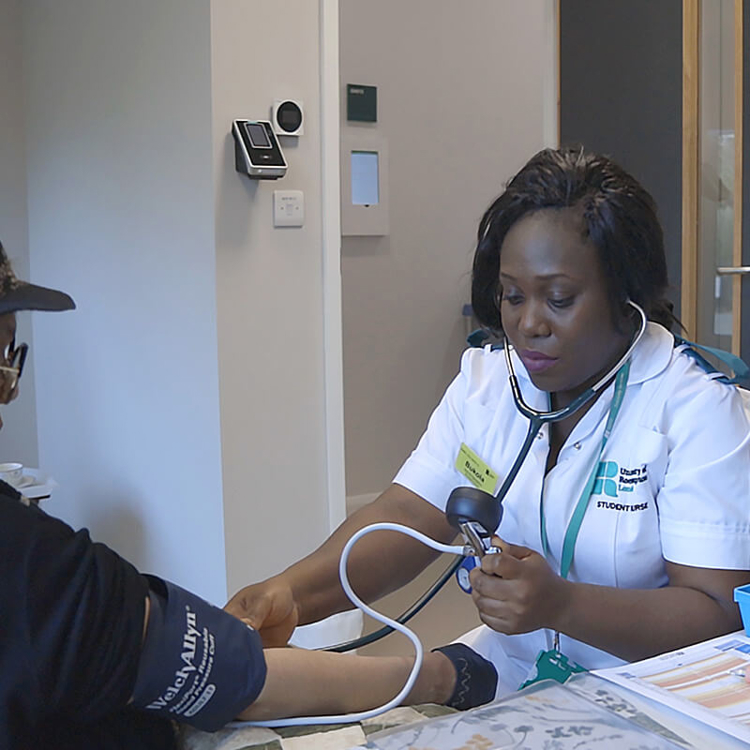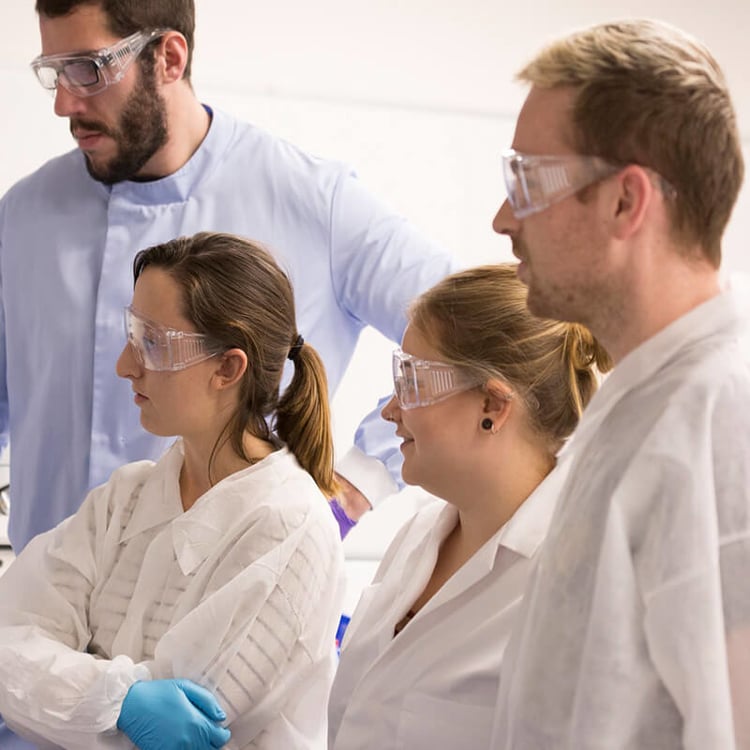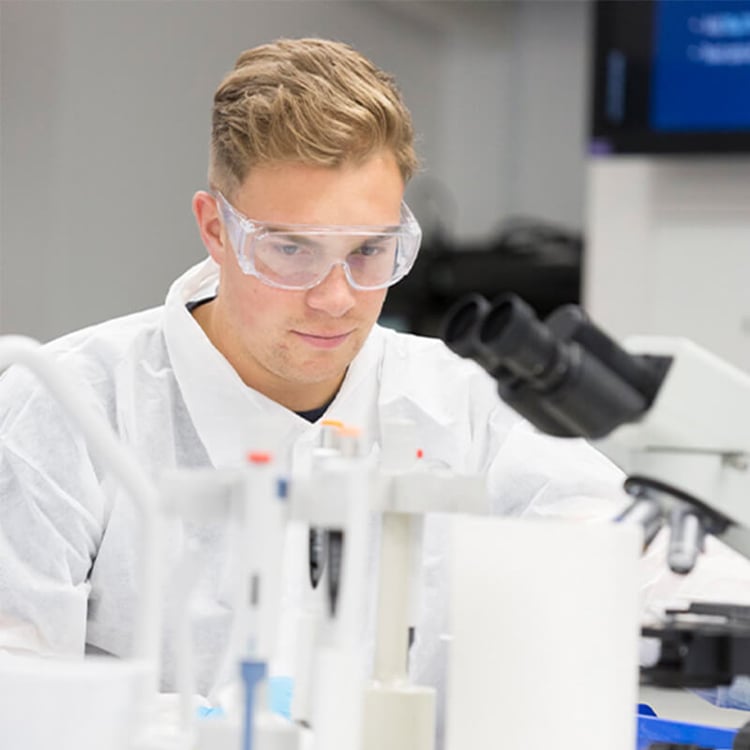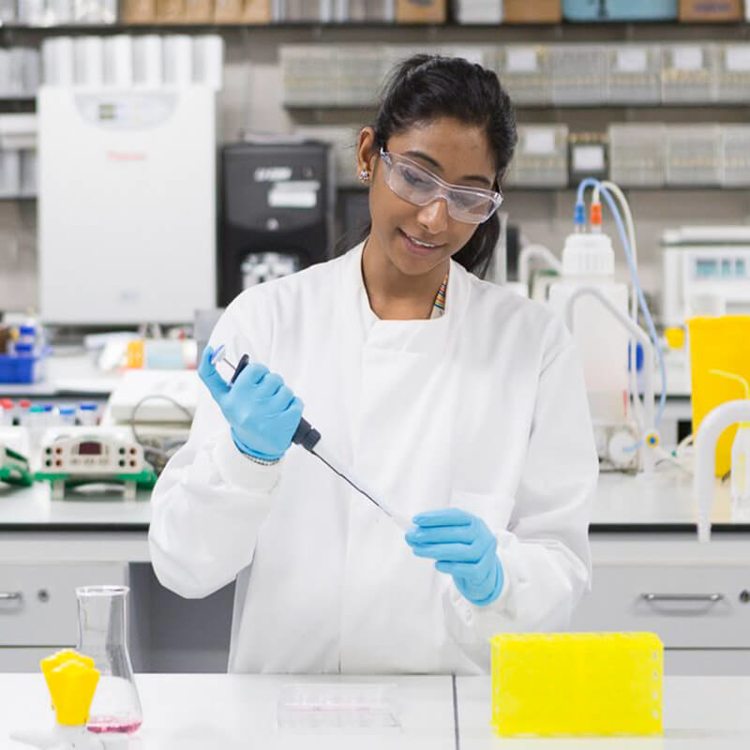Duration:
2 years (full-time)
Number of credits:
180
Start date(s):
September 2025
September 2026
Learn to become an Occupational Therapist and enable people of all ages to overcome challenges with completing everyday tasks or activities.
Did you know?
This programme is accredited by the Royal College of Occupational Therapists (RCOT), which signifies that the programme aligns with professional standards, providing recognition and support within the occupational therapy field.

This programme is also accredited by the Health and Care Professions Council (HCPC), which ensures that the programme meets high standards of training and professional practice, enhancing your employability and credibility in the healthcare sector.

Modules
These modules are those we currently offer and may be subject to change.
Year One
- Foundations of Occupational Therapy
- Enabling Occupational Participation
- Professional Skills for Health
- Research Methods for Healthcare Practice
- Practice Placement 1
Year Two
- Enhancing and Emerging Communities of Practice
- Contemporary Leadership and Innovation
- Application of Evidence-Based Practice in Occupational Therapy (*Dissertation Module)
- Practice Placements 2 + 3
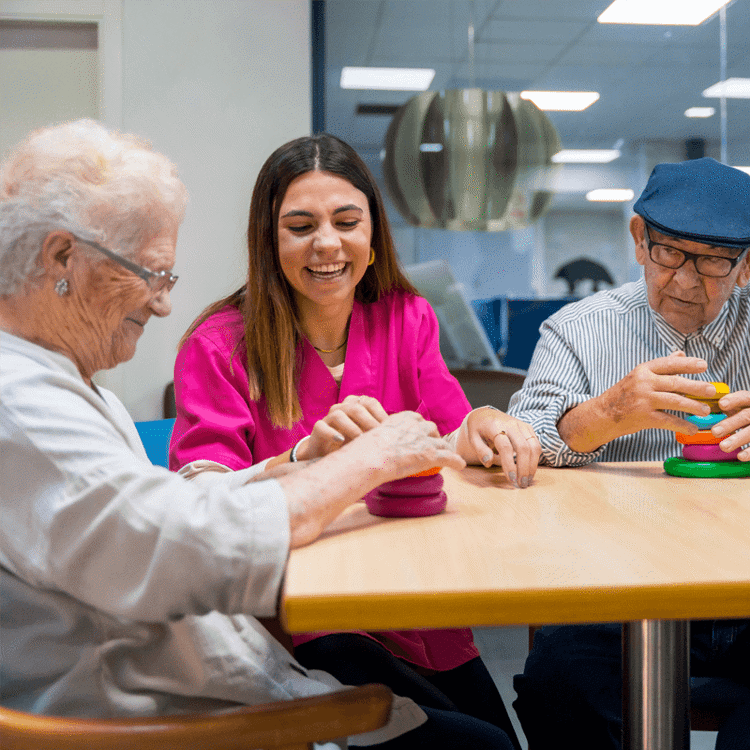
Skills
Make a difference to human lives with a postgraduate degree in Occupational Therapy.
This programme is aimed at students wanting to become Occupational Therapists, giving you the skills to provide exceptional care to a wide range of individuals:
- Those living with physical and mental health conditions
- People with learning disabilities
- Across the lifespan
The programme focuses on getting you ready to work in health and social care organisations, housing, education and voluntary organisations. Throughout the course you will gain practical skills and experience by learning how to:
- Develop skills, knowledge and understanding necessary for competent occupational therapy practice
- Assess and critically analyse the professional and scientific knowledge base which informs occupational therapy practice
- Practice using knowledge and skills specific to occupational therapists, so as to optimise the health and social well-being of the people you work with.
This programme also focuses on community and social care, in line with the NHS Long Term Plan and associated workforce strategy.
Roehampton has longstanding significant expertise in the broad field of health and wellbeing which are all relevant to the development and delivery of the pre-registration Occupational Therapy curriculum.
Practice-based learning is central to the educational process, which includes curriculum content and is an educational method but is acknowledged separately because specific standards and criteria apply. Practice-based learning is appropriately integrated throughout the curriculum, with one external and one simulated placement in year 1 and two external placements in year 2. Practice-based learning helps enable the learner’s formation of their identity as an occupational therapist. The overall learning outcome for practice education within the MSc Occupational Therapy (pre-reg) programme is aligned with the professional standards for practice and the ethical and professional conduct expectations of the profession.
The Royal College of Occupational Therapists (RCOT) require placements to be an integral part of a preregistration programme, facilitating ‘the learners’ formation of their identity as an occupational therapist and develops learners to meet the professional standards for practice and the ethical and professional conduct expectations of the profession’ (Learning and Development Standards for preregistration Education 2023).
Successful completion (ie, passing grade) of a minimum of 1000 practice placement hours is required in order to become a registered Occupational Therapist with the HCPC, RCOT and for recognition by the World Federation of Occupational Therapists.
Over the course of the two years of the programme, the practice placement structure will consist of:
- Year 1: One five-week part-time simulated placement; and one nine-week full time placement.
- Year 2: Two, nine-week full time placements.
- Pre-registration placements cannot be assessed at level 7 and are therefore assessed on a pass/fail basis at levels 4 (PP1), 5 (PP2) and 6 (PP3).
Learning
Learn in a stimulating environment.
You will learn via a wide variety of methods. There will be lectures, seminars and practical sessions in specialised teaching spaces such as the brand-new Mary Seacole Health Innovation Centre . Online learning material will also be available to support sessional teaching. You will also undertake placements with local health and social care organisations.
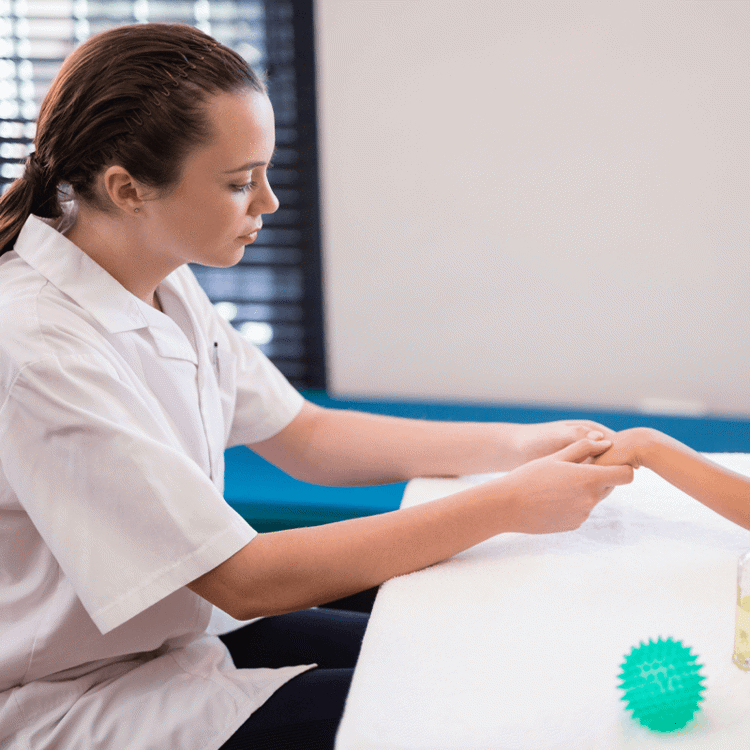
Assessment
Push yourself with real world assessments.
Assessment will be via a range of different methods including:
- written reports
- portfolios
- reflective logs
- presentations
A variety of assessments are proposed to reflect the learning outcomes and the needs of graduates in the health and social care workplace. Emphasis on the assessment is for students to demonstrate critical analysis of theory practice links. Each module is assessed formatively and summatively to support ongoing learning and development from feedback.
Careers
Shape the future of public health.
The MSc in Occupational Therapy is designed and delivered so that you will be able to meet the professional and regulatory body standards. Graduates will be skilled, innovative, intellectually proficient, autonomous and employable occupational therapists, who can contribute to the future development of the profession.
There is an acute shortage of Occupational Therapists so you will have lots of career options. Occupational Therapists can work in:
- the NHS
- schools
- social care
- private practice
- third sector
- prisons and probationary services
- research and education

Our careers team is available to support you from the start of your studies until after you graduate. We will help you build your CV, prepare for interviews, and meet and learn from successful graduates working at the top of their careers.
Open days
Get a real taste of our campus, community and what it’s like to study at Roehampton
Applying
UK postgraduate students apply through our direct application system.
Course subject to curriculum enhancement and revalidation.
Previous Qualifications
We would normally ask all applicants to have completed five GCSEs at grade C or above, including mathematics, English language or literature and a science subject or equivalent. A-level qualifications or equivalent.
A UK undergraduate honours degree at 2.2 or above, or an equivalent international qualification.
Degrees could include biological sciences, sport science, nursing, psychology, arts, business, sociology, healthcare, creative arts and drama. Other degrees will be considered on an individual basis. If the first degree is not in a relevant subject, the applicant should have completed a research project as part of the undergraduate degree.
Evidence of interest and preferably work experience in a relevant field.
Additional Requirements
Non-native English speakers who do not have GCSE English or equivalent at grade 4/C or above, will require an IELTS score of at least 6.5 in writing and at least 7.0 in reading, listening and speaking, with a minimum overall score of 7.0. Please refer to the HCPC website for more details.
Values-Based Interview
All applicants must complete a values-based interview as part of their application to the programme. Each of the questions asked in the interview relates to a particular domain/value. The domains are:
- Your knowledge of the professional field for which you are applying.
- Your personal qualities and suitability for the profession. To help with discussion around this domain, you may be asked to consider a scenario and asked questions about how you would respond to it.
- Your understanding of and suitability for the course at the University of Roehampton.
Interviewers will also consider your understanding of the values that are required of a health and social care professional (Equality and Diversity, Teamwork, Compassion, Respect & Dignity, etc). This will also include your understanding of moral and ethical values, competence and self-awareness, among others. You won’t necessarily be asked specific questions about these areas, but the information you include in your answers to all questions will be considered when the interviewer(s) assess you. Values based recruitment is an approach which attracts and recruits applicants on the basis that their individual values and behaviours align with the values of the NHS Constitution.
Pre-enrolment requirements
If you are offered a place on the programme, part of the condition of your offer will include the successful completion and submission of the following:
DBS & Occupational Health Clearance
All applicants are required to complete an Enhanced Disclosure and Barring Service screening prior to enrolment, additionally occupational health clearance is required prior to going out on the first practice placement. While the Enhanced DBS must be completed at the applicant’s expense, the Occupational Health appointment will be covered by the programme.
Recognition of Prior Learning (RPL) Process
A Fair Recognition Process
Transfers from other programmes is welcome. Recognition of prior learning will be offered to all applicants through a fair and transparent process. Applicants will be supported by the University throughout the recognition of prior learning application process. For specific questions about transferring onto the MSc Occupational Therapy (pre-registration) programme from another course, please get in touch with the programme lead, by email (caitlin.hardy-hyland@roehampton.ac.uk).
Maximum Recognition Limit
A maximum of one-third of the total pre-registration programme may be considered for recognition of prior learning, including any prior practice placements. In circumstances of transferring between different occupational therapy pre-registration programmes (level 7), additional considerations and responsibilities for both education providers will apply. We will strive to work with the transferring institution to help ensure a smooth process onto our programme.
Essential Information
The following section is some key information we would like to make all applicants aware of, before they apply:
- You must have graduated within 10 years of the start date of the course or be able to provide relevant evidence of further study or professional experience.
- You must also have a profile of secondary qualifications in arts and sciences (A-level or equivalent).
- You need to have minimum grade C/4 (or equivalent) in GCSE Science, Maths and English.
- Our admissions criteria also include requirements such as: a clear understanding of Occupational Therapy; a broad range of relevant work shadowing; an interest in people and a commitment to strong academic attainment.
It is normal for undergraduate students to apply for entry to postgraduate programmes in their final year of study. Applicants who have not yet been awarded a degree may be offered a place conditional on their attaining a particular class of degree. Please note, if you are already a qualified Occupational Therapist (in either the UK or abroad) this course is not suitable and you may wish to consider our other professional health courses delivered at Degree and Master’s level.
After successfully completing an accredited pre-registration programme such as ours you must apply to register with the HCPC in order to work as a registered healthcare professional in the UK. This course equips you with the skills necessary to practise as an occupational therapist both internationally and in the UK. International students who complete the course will be eligible to apply to the HCPC.
Programme requirements to graduate with the full MSc Occupational Therapy:
Completion of an individual research dissertation in the second year of the course, in order to graduate with the full MSc Occupational Therapy (pre-registration) degree. In the event that students fail all attempts of the research dissertation, but have successfully completed the 1000 hours of practice placements, they may still qualify to receive the exit award option of a Post Graduate Diploma (PG Dip) in Occupational Therapy (L7, 140 credits) and therefore be eligible to register with the Health and Care Professions Council.
Professional requirements to apply to register as a qualified Occupational Therapist
Successful completion (ie, passing grade) of a minimum of 1000 practice placement hours is required in order to become a registered Occupational Therapist with the Health and Care Professions Council, RCOT and for recognition by the World Federation of Occupational Therapists.
HCPC Registration
Upon completion of the course, and in order to meet the requirements that must be met in order to be eligible to apply to the HCPC Register, students must submit several personal declarations as part of their application to the Health and Care Professions Council. These include:
- Declaration of Vetting and Barring
- Declaration of Health and Good Character
- Proof of Professional Qualification certificate
Applicants to the HCPC Register will also need to provide:
- Certified copy of a proof of identity document
- Certified copy of a proof of address document
See the link to the HCPC for more details on the registration process to the HCPC.
Programme status
This pre-registration course is offered within the School of Life and Health Sciences at the University of Roehampton and is approved by the Health and Care Professions Council (HCPC) and accredited by the Royal College of Occupational Therapists. As of June 2024, programme approval with the Health and Care Professions Council (HCPC) and programme accreditation with the Royal College of Occupational Therapists (RCOT) are pending final approval/accreditation from both bodies.
General entry requirements
September 2025 entry tuition fees (UK)
| Level of study | Full-time* |
| MSc | £9,535 |
*Year 1 fee
We offer a wide range of scholarships and bursaries. See our financial support pages for UK students.
We also provide other ways to support the cost of living, including free buses and on-campus car parking, hardship support and some of the most affordable student accommodation and catering in London. Find out more about how we can support you.
International postgraduate students apply through our direct application system.
Course subject to curriculum enhancement and revalidation.
Previous Qualifications
We would normally ask all applicants to have completed five GCSEs at grade C or above, including mathematics, English language or literature and a science subject or equivalent. A-level qualifications or equivalent.
A UK undergraduate honours degree at 2.2 or above, or an equivalent international qualification.
Degrees could include biological sciences, sport science, nursing, psychology, arts, business, sociology, healthcare, creative arts and drama. Other degrees will be considered on an individual basis. If the first degree is not in a relevant subject, the applicant should have completed a research project as part of the undergraduate degree.
Evidence of interest and preferably work experience in a relevant field.
International students
We have several places available for students from outside the UK on our programme. Potential candidates need to be able to demonstrate the high academic credentials required for the course, as well as good English Language qualifications.
Additional Requirements
Non-native English speakers who do not have GCSE English or equivalent at grade 4/C or above, will require an IELTS score of at least 6.5 in writing and at least 7.0 in reading, listening and speaking, with a minimum overall score of 7.0. Please refer to the HCPC website for more details.
Values-Based Interview
All applicants must complete a values-based interview as part of their application to the programme. Each of the questions asked in the interview relates to a particular domain/value. The domains are:
- Your knowledge of the professional field for which you are applying.
- Your personal qualities and suitability for the profession. To help with discussion around this domain, you may be asked to consider a scenario and asked questions about how you would respond to it.
- Your understanding of and suitability for the course at the University of Roehampton.
Interviewers will also consider your understanding of the values that are required of a health and social care professional (Equality and Diversity, Teamwork, Compassion, Respect & Dignity, etc). This will also include your understanding of moral and ethical values, competence and self-awareness, among others. You won’t necessarily be asked specific questions about these areas, but the information you include in your answers to all questions will be considered when the interviewer(s) assess you. Values based recruitment is an approach which attracts and recruits applicants on the basis that their individual values and behaviours align with the values of the NHS Constitution.
Pre-enrolment requirements
If you are offered a place on the programme, part of the condition of your offer will include the successful completion and submission of the following:
DBS & Occupational Health Clearance
All applicants are required to complete an Enhanced Disclosure and Barring Service screening prior to enrolment, additionally occupational health clearance is required prior to going out on the first practice placement. While the Enhanced DBS must be completed at the applicant’s expense, the Occupational Health appointment will be covered by the programme.
Recognition of Prior Learning (RPL) Process
A Fair Recognition Process
Transfers from other programmes is welcome. Recognition of prior learning will be offered to all applicants through a fair and transparent process. Applicants will be supported by the University throughout the recognition of prior learning application process. For specific questions about transferring onto the MSc Occupational Therapy (pre-registration) programme from another course, please get in touch with the programme lead, by email (caitlin.hardy-hyland@roehampton.ac.uk).
Maximum Recognition Limit
A maximum of one-third of the total pre-registration programme may be considered for recognition of prior learning, including any prior practice placements. In circumstances of transferring between different occupational therapy pre-registration programmes (level 7), additional considerations and responsibilities for both education providers will apply. We will strive to work with the transferring institution to help ensure a smooth process onto our programme.
Essential Information
The following section is some key information we would like to make all applicants aware of, before they apply:
- You must have graduated within 10 years of the start date of the course or be able to provide relevant evidence of further study or professional experience.
- You must also have a profile of secondary qualifications in arts and sciences (A-level or equivalent).
- You need to have minimum grade C/4 (or equivalent) in GCSE Science, Maths and English.
- Our admissions criteria also include requirements such as: a clear understanding of Occupational Therapy; a broad range of relevant work shadowing; an interest in people and a commitment to strong academic attainment.
It is normal for undergraduate students to apply for entry to postgraduate programmes in their final year of study. Applicants who have not yet been awarded a degree may be offered a place conditional on their attaining a particular class of degree. Please note, if you are already a qualified Occupational Therapist (in either the UK or abroad) this course is not suitable and you may wish to consider our other professional health courses delivered at Degree and Master’s level.
After successfully completing an accredited pre-registration programme such as ours you must apply to register with the HCPC in order to work as a registered healthcare professional in the UK. This course equips you with the skills necessary to practise as an occupational therapist both internationally and in the UK. International students who complete the course will be eligible to apply to the HCPC.
Programme requirements to graduate with the full MSc Occupational Therapy:
Completion of an individual research dissertation in the second year of the course, in order to graduate with the full MSc Occupational Therapy (pre-registration) degree. In the event that students fail all attempts of the research dissertation, but have successfully completed the 1000 hours of practice placements, they may still qualify to receive the exit award option of a Post Graduate Diploma (PG Dip) in Occupational Therapy (L7, 140 credits) and therefore be eligible to register with the Health and Care Professions Council.
Professional requirements to apply to register as a qualified Occupational Therapist
Successful completion (ie, passing grade) of a minimum of 1000 practice placement hours is required in order to become a registered Occupational Therapist with the Health and Care Professions Council, RCOT and for recognition by the World Federation of Occupational Therapists.
HCPC Registration
Upon completion of the course, and in order to meet the requirements that must be met in order to be eligible to apply to the HCPC Register, students must submit several personal declarations as part of their application to the Health and Care Professions Council. These include:
- Declaration of Vetting and Barring
- Declaration of Health and Good Character
- Proof of Professional Qualification certificate
Applicants to the HCPC Register will also need to provide:
- Certified copy of a proof of identity document
- Certified copy of a proof of address document
See the link to the HCPC for more details on the registration process to the HCPC.
Programme status
This pre-registration course is offered within the School of Life and Health Sciences at the University of Roehampton and is approved by the Health and Care Professions Council (HCPC) and accredited by the Royal College of Occupational Therapists. As of June 2024, programme approval with the Health and Care Professions Council (HCPC) and programme accreditation with the Royal College of Occupational Therapists (RCOT) are pending final approval/accreditation from both bodies.
General entry requirements
General entry requirements
September 2025 entry tuition fees (international)
| Level of study | Full-time* |
| MSc | £18,250 |
*Year 1 fee
We offer a wide range of scholarships and bursaries. See our financial support pages for international students.
We also provide other ways to support the cost of living, including free buses and on-campus car parking, hardship support and some of the most affordable student accommodation and catering in London. Find out more about how we can support you.


